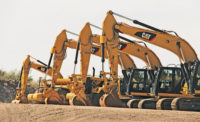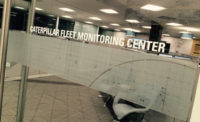More than 2,000 craft workers are buzzing like bees inside a new 1,600-MW powerplant under construction near Franklin, Texas. Supplying the trades with forklifts, grinders, welding machines, safety glasses—even ice for water coolers—normally would be a logistical nightmare for all the contractors involved in the $2-billion project.
But AMECO, the chief supplier on the job, has been handling these services for over 60 years. At Luminant’s Oak Grove Steam Electric Station, due to supply power to about one million homes by mid-2010, AMECO is supplying $1.4 million in small tools along with more than 580 other larger items, like pickup trucks and cranes. Its responsibilities are broad. “If the commode don’t flush, guess who they call?” says Harry Mayer Jr., AMECO’s director of Western projects.
As construction sites for projects such as powerplants, refineries and dams grow in complexity, AMECO is gaining share in the competitive rental market. Yet it is not just a rental company; it is a total jobsite supplier. It purchases equipment, consumables and re-rents vehicles from other suppliers as needed to finish a job.
“We provide everything from Crescent wrenches to cranes,” Mayer says.
Much has changed in just a few years. In 2003, 80% of the Greenville, S.C.-based firm’s work served U.S. projects, and most of it was managed by its parent company, Irving, Texas-based Fluor Corp. Today, AMECO’s market has flip-flopped; 80% of its jobs are outside of the U.S. and chiefly serve non-Fluor clients.
Public and private owners are taking a harder look at rationalizing how to execute construction, and equipment, tools and consumables are increasingly considered commodities attached to huge capital outlays. As companies grow globally, the cost of iron is compounded across borders, tax codes and currency rates, suggesting a need to squeeze suppliers and streamline spending.
“Owners prefer to spend money to purchase a new chemical plant…not to purchase equipment,” explains Paulo Oscar Auler Neto, equipment superintendent for Rio de Janeiro, Brazil-based Odebrecht Engineering and Construction. "We consider the equipment as a tool that we need to use to do the job. It’s a big, expensive tool, but it’s still a tool.”
Odebrecht, which owns an $850-million equipment fleet, spent $357 million on rolling stock last year. But it is making a conscious effort to shift from being an equipment owner to a user. It is presently sourcing about 500 machines from AMECO for projects in Panama, Peru, Dominican Republic, Mozambique and Djibouti. As it has expanded around the world, Odebrecht has changed its procurement philosophy. “Every jobsite is like an individual company,” says Auler Neto. “We can supply a different jobsite according to a different requirement.” In total, about 60% of fleet needs are now farmed out, he says.
Contractors like Odebrecht are willing to spend 5% to 10% more to outsource equipment and maintenance because it avoids paying long-term, indirect costs, like depreciation and parts inventory. That advantage passes savings to the project owner. “The idea is that Odebrecht could be organized as a very big construction company and not as a big owner of equipment,” Auler Neto explains.
At Oak Grove, Fluor, the prime contractor, and several other subs are using AMECO, where it has tool containers splayed across the site linked by a wireless network. For security, every tool is tracked electronically like a library book. To keep invoicing simple, AMECO gives the contractor a fixed cost for every craft hour spent, says Mark Murfin, AMECO’s vice president of sales and marketing.
In today’s financial environment—with large-scale projects getting shelved or cancelled—AMECO looks even more attractive. “When the economy looks like this, contractors are even more averse to purchasing fleet,” says Gary Bernardez, AMECO’s president. “When we do have the business, we are seeing our key customers actually looking to increase their rental and service requirements. They don’t want to put their capital into fleet.”
The $550-million-a-year business has spurred capital expenditures of over $100 million a year. Last year, AMECO owned a spread of equipment worth about $500 million in replacement value, a 20.7% increase since the prior year, according to Construction Equipment, which ranks heavy industrial fleets. “Our largest single category, both in dollars and units, is pickup trucks,” says Dean Smith, AMECO vice president in charge of the roughly 11,000 total pieces of equipment.
Procuring a global fleet of thousands of pickup trucks, let alone dozens of other equipment categories, presents a number of challenges. Deploying mainly Ford-brand trucks, AMECO looks for vendors that have the ability to supply large numbers of vehicles with bare-bones trim.
“Very few people walk into a dealership and say, ‘I need something with rubber floors, vinyl seats, manual windows and no cruise control,’ ” says Smith, a former Hertz and Home Depot executive.
For the past three years since coming to AMECO, Smith has been fine-tuning his role as the central procurement source of the firm’s so-called “flywheel” regions—North America/Caribbean, Central America/Mexico, South America and Africa/Middle East. “The fleet is still owned by the regions, but he is the administrator,” says Bernardez, who hired Smith to help put the pieces together.
Unlike other rental companies, which typically stick to traditional lines of tools and equipment, AMECO sets no boundaries. This wide variety is what Smith says keeps him coming to work every day.
“Others have a box that they stay in. What we consider in the box, everybody else would not...even [have] on their radar screen,” he says, adding that if a client needed pens on his desk, AMECO would find a way to supply them at low cost. “I won’t say you can buy cheaper tools, but I’ll guarantee you can’t buy as good [quality] tools cheaper,” Mayer adds.
As such, AMECO is an aggressive and opportunistic buyer. Smith attended a large auction near Orlando in February, picking up several machines at low prices. New machines are purchased with volume discounts. The firm also services, rebuilds and certifies its gear; is the largest Case dealer in Mexico, with 19 locations; and, like many large contractors, standardizes its fleet when possible.
AMECO’s growth strategy has reaped results, but moving forward, its challenge will be mobilizing into new markets without losing its iron grip. Smith is working to keep the diversity under control. “You’ll never figure out what we do because I still haven’t figured out what we do,” he says. “We do a little bit of everything; all our eggs aren’t in one basket.”

















